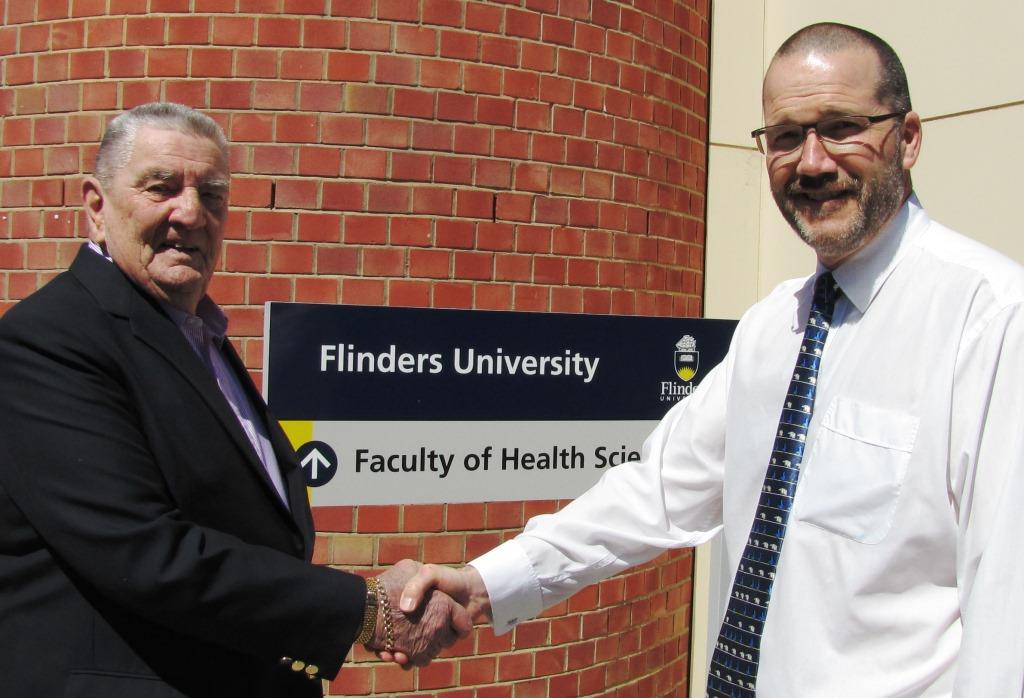
A national medication study is aiming to help thousands of Australians who struggle every day with shortness of breath.
The large-scale clinical study, led by Flinders University, is seeking more than 170 participants in South Australia, Victoria, New South Wales, Queensland and Western Australia to measure benefits of using a regular low dose, extended release morphine capsule to relieve the debilitating effects of chronic breathlessness.
More than 300,000 Australians are affected by chronic breathlessness, with about 75,000 of them housebound with extremely limited day-to-day activity, says Professor David Currow, who leads the Australian national Palliative Care Clinical Studies Collaborative (PaCCSC).
“Chronic refractory breathlessness affects every aspect of life, even at rest or with minimal exertion and despite of optimal treatment of the underlying causes,” says Professor Currow, who has spent the past 18 years investigating better treatments for the condition.
“As the population ages, more people will experience chronic breathlessness as a result of emphysema, heart failure and cancer. Finding ways to reduce breathlessness will help to reduce suffering across our community,” he says.
“With this definitive study, we can do something about chronic breathlessness and significantly improve the quality of life for thousands of people.”
No medication is registered for the symptomatic reduction of chronic breathlessness despite recommendations from the American Thoracic Society, the American College of Physicians, the Canadian Thoracic Society and the American College of Chest Physicians that regular, low-dose morphine is the evidence-based pharmaceutical option.
Regulatory approval could see the drug approved for this additional use in Australian health care.
Participants in the multi-site, Phase study will take part in testing extended-release oral morphine and compare this to a placebo, meaning some participants will get the active medication and others will get the placebo. Neither the participants nor their treating clinicians will know to which arm people have been randomly assigned.
The condition is common among people with chronic obstructive pulmonary disease (COPD), lung disease, heart failure and neuro-generative diseases such as motor neurone disease and cachexia.
With breathlessness (or refractory dyspnoea) a prominent symptom among patients with advanced lung or heart disease, nearly one half of all people experience distressing breathlessness during the last year of life.
The project is fully funded by a three-year $860,000 million National Health and Medical Research Council grant from the Australian Government.
The study will be conducted at the following sites.
SOUTH AUSTRALIA: Southern Adelaide Palliative Services (Repatriation General Hospital and Flinders Medical Centre), Lyell McEwin Hospital, Adelaide.
VICTORIA: Royal Melbourne, St Vincent’s Hospital, Austin Health, Melbourne Health and Barwon Health, Geelong.
NEW SOUTH WALES: Greenwich Hospital, Liverpool Hospital, Concord Hospital, Sacred Heart Health Service, Sydney, Calvary Health Care, Kogarah and Calvary Mater Hospital, Newcastle.
QUEENSLAND: Mater Health Service, Prince Charles Hospital, St Vincent’s Private Hospital, Brisbane and Nambour Hospital, Nambour.
WESTERN AUSTRALIA: to be decided.
Professor of Palliative and Supportive Services at Flinders University David Currow was the 2015 joint recipient of the American Academy of Hospice and Palliative Medicine Excellence in Scientific Research in Palliative Care Award. The US award recognises meaningful, exemplary research contributions to the field of hospice and palliative care.
Mayne Pharma, the specialty pharmaceutical company, has collaborated with Flinders University in connection with this clinical trial.
To participate, people can contact Flinders Palliative Care Clinical Studies Collaborative (PaCCSC) at Flinders University Adelaide on 08 8275 1926.

